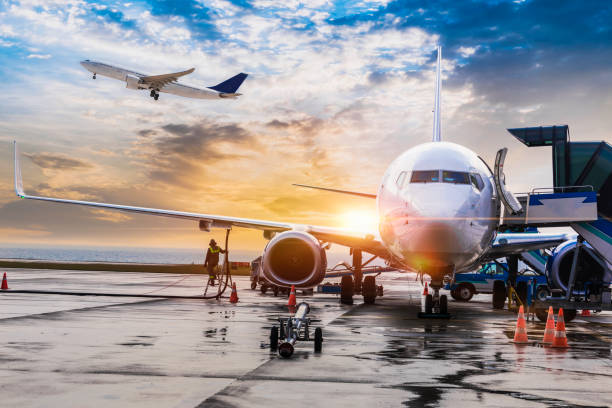How do I get a Job in the Airline Industry? It’s a question that many passionate individuals about aviation and travel ask themselves. With diverse career paths available, from pilots to flight attendants, mechanics to ground crew, the airline industry offers exciting opportunities for those looking to take to the skies.
But how do you land your dream job in this competitive industry? In this article, we’ll explore some tips and strategies to help you navigate the job search process and increase your chances of success. So fasten your seatbelt and prepare for takeoff as we explore the world of aviation employment.

Table of contents
- Salary Outlook For The Airline Industry
- What Are The Benefits Of Working In The Airline Industry?
- What Are The Qualifications & Requirements For A Career In The Airline Industry?
- How Do I Get A Job In The Airline Industry?
- Career Opportunities In The Airline Industry
- Frequently Asked Questions
- Conclusions
- References
- Recommendations
Salary Outlook For The Airline Industry
The airline industry is a dynamic and rapidly growing sector that employs many professionals in different areas of expertise. As with any other industry, the airline industry’s salaries usually depend on experience, job role, location, company size, and market demand.
According to recent reports, the average salary for airline professionals in the United States ranges from $28,000 to $174,000 annually. The salary outlook for the airline industry varies widely based on several factors. For example, airline pilots are among the highest-paid professionals in the industry, with an average salary of $121,430 per year. Other high-paying roles in the airline industry include airline managers, air traffic controllers, and aircraft mechanics.
Finally, salaries in the airline industry tend to be higher for professionals with extensive experience and advanced qualifications. For instance, pilots with more than ten years of experience can earn up to $250,000 per year, while air traffic controllers with advanced certifications can earn salaries from $100,000 to $200,000 annually.
Also read: What Are the Different Types of Executive-Level Jobs in 2023? How to Apply
What Are The Benefits Of Working In The Airline Industry?
Working in the airline industry can be a rewarding and exciting experience. Whether you’re a pilot, flight attendant, aircraft mechanic, or air traffic controller, there are numerous benefits to working in this dynamic sector. Some benefits include the following:
Competitive Salaries
The airline industry is known for offering competitive salaries to its employees. Pilots, for instance, can earn up to $250,000 per year, while aircraft mechanics can earn up to $75,000 per year. The industry also offers various benefits, including health insurance, retirement plans, and other perks.
Travel Opportunities
One of the most significant perks of working in the airline industry is the opportunity to travel to different parts of the world. Pilots and flight attendants, for example, get to travel to various destinations, which can be an exciting experience for many people.
Job Stability
The airline industry is known for providing job stability to its employees. Despite occasional economic downturns, the industry continues to grow, and there is always a demand for skilled professionals. This makes it a reliable sector for individuals looking for long-term employment.
Career Advancement
The airline industry provides numerous opportunities for career advancement. Pilots, for example, can become captains, while flight attendants can become lead attendants or trainers. Air traffic controllers can also advance to supervisory or management positions.
Training and Development
The airline industry significantly emphasizes training and development, ensuring that its employees have the necessary skills and knowledge to perform their duties safely and efficiently. This training often includes ongoing education and professional development opportunities, allowing employees to stay up-to-date with industry trends and best practices.
Team-oriented Environment
The airline industry is known for fostering a team-oriented work environment. Pilots, flight attendants, and air traffic controllers all work together to ensure the safety and comfort of passengers. This collaborative work culture can be rewarding and fulfilling for many individuals.
Job diversity
The airline industry offers many job opportunities, including pilots, flight attendants, mechanics, dispatchers, etc. This diversity allows individuals to choose a career path that aligns with their interests, skills, and qualifications.
Also read: What Does a Chief Cook Do? Full Explanations with FAQs
What Are The Qualifications & Requirements For A Career In The Airline Industry?
The airline industry is a vast and dynamic field that offers a variety of exciting career opportunities. However, it is a highly regulated industry, and most jobs require specific qualifications and requirements.
Below are some qualifications and requirements you should consider before pursuing a career in the dynamic industry.
Education
Most jobs in the airline industry require a minimum of a high school diploma or equivalent. However, many jobs, especially management, require a bachelor’s degree. A degree in aviation management, engineering, or business is preferred.
Technical Skills
Many jobs in the airline industry require technical skills. For example, pilots must have a commercial pilot’s license and a specific number of flight hours. Mechanics must have FAA certification with adequate training in specific aircraft types. Air traffic controllers must complete a rigorous training program and pass exams.
Language Skills
Most airlines require employees to speak fluent English, as it is the language of international aviation. However, speaking multiple languages is advantageous, especially for customer service or flight operations jobs.
Physical Requirements
Some jobs in the airline industry require specific physical attributes. Pilots must have good vision, hearing, and reflexes. Flight attendants must be able to lift heavy objects and stand for long periods. These physical requirements ensure that employees can work efficiently, even under duress.
Security Clearance
Many jobs in the airline industry require a security clearance. This is especially true for jobs that involve working with passengers or cargo. Applicants must pass a background check and be able to obtain a security clearance.
Customer Service Skills
The airline industry is service-oriented, and customer service skills are essential. Employees must be able to interact with passengers professionally and courteously, handle complaints and resolve issues.
Computer Skills
The airline industry relies heavily on technology; many jobs require computer skills. For example, pilots use computers to navigate and control aircraft.
Mechanics use computerized diagnostic equipment to troubleshoot problems. Customer service representatives use computers to check passengers in and manage reservations.
Flexibility
Jobs in the airline industry often require flexibility, as employees may work irregular hours, including nights, weekends, and holidays. They may also need to work in different time zones and travel frequently.
Also read: What is Intervention in Education (Full Explanation with FAQs)
How Do I Get A Job In The Airline Industry?
Getting a job in the airline industry can be an exciting and fulfilling experience. However, the industry’s highly competitive nature can make landing a job difficult.
The steps highlighted below will help increase your chances of getting a job in the airline industry.
Step 1: Research the Industry
Before applying for a job in the airline industry, it is essential to research the industry thoroughly. Learn about the various job roles, requirements, and the skills and qualifications needed for each position.
Research different airlines and their job opportunities, and identify the ones that align with your skills and career goals.
Step 2: Networking
Networking is an essential tool for finding a job in the airline industry. Attend job fairs, industry events, and conferences, and meet people working there.
Join online forums and social media groups where industry professionals discuss job openings and share information about the industry. Try to make acquaintance with people holding the same role you’re going for in the industry.
Step 3: Build Your Skills
Most jobs in the airline industry require specific technical skills. Identify the skills necessary for your desired position and work towards developing those skills.
Consider getting additional training, certification, or education in areas relevant to the job. For example, to become a pilot, you must get a commercial pilot’s license and a specific number of flight hours.
Step 4: Create A Professional Resume
A well-crafted resume is essential when applying for a job in the airline industry. Ensure your resume is tailored to the job you are applying for and highlights your relevant skills and experience. Include any relevant certifications, training, and education. Ensure that your resume is free of errors and visually appealing.
Step 5: Apply for Jobs
Once you have identified job opportunities that match your skills and qualifications, apply for them. Follow the application instructions carefully and meet all the job requirements.
Be sure to customize your cover letter and resume for each job application. Using a particular resume for applying to different job openings can reduce your chances of getting in.
Step 6: Prepare for Interviews
If you are selected for an interview, make sure you prepare well. Research the company and the job role thoroughly, and prepare answers to common interview questions.
Dress professionally and arrive early for the interview. Be prepared to discuss your skills, experience, and qualifications in detail.
Step 7: Stay Positive
The airline industry is highly competitive, and landing your dream job may take some time. Don’t give up, and stay positive. Keep networking, building your skills, and applying for jobs. Remember that persistence pays off.
Also read: In What Country Is It Easiest to Become a Doctor in?
Career Opportunities In The Airline Industry
The airline industry employs diverse professionals to ensure the smooth operation of flights and airlines. Some popular career opportunities in the field include:
#1. Pilot
Pilots are responsible for flying commercial airplanes and transporting passengers and cargo from one destination to another. They must have a commercial pilot’s license and undergo rigorous training and certification to become qualified. Pilots have a high level of responsibility and must be able to work well under pressure.
#2. Flight Attendant
Flight attendants are responsible for ensuring the safety and comfort of passengers during flights. They must have excellent communication and customer service skills and work well in a team.
Flight attendants receive safety procedures, emergency situations, and passenger service training.
#3. Air Traffic Controller
Air traffic controllers are responsible for managing the flow of air traffic, ensuring that planes take off and land safely and on time. They need to have excellent communication and decision-making skills and the ability to work under pressure. Air traffic controllers receive extensive training to prepare them for this critical role.
Also read: What Is ROTC In High School? (Full Explanation With FAQs)
#4. Aircraft Mechanic
Aircraft mechanics are responsible for maintaining and repairing airplanes, ensuring they are safe and operational. They need to have a strong knowledge of aircraft systems and components and the ability to troubleshoot and solve problems quickly.
Aircraft mechanics receive training in maintenance and repair procedures and safety and quality control.
#5. Airport Manager
Airport managers are responsible for overseeing the daily operations of airports, including facilities management, security, and customer service. They need to have strong leadership and management skills and a deep understanding of airport operations and regulations.
Airport managers receive training in airport management, business administration, and other relevant fields.
#6. Airline Marketing Manager
Airline marketing managers are responsible for developing and implementing marketing strategies to promote the airline and increase revenue. They need strong communication and analytical skills and a deep understanding of consumer behavior and market trends. Airline marketing managers receive training in marketing, advertising, and business management.
Also read: Top Universities For Nursing in UK | 2023
#7. Cargo Agent
Cargo agents are responsible for managing the logistics of transporting cargo by air. This includes handling and tracking shipments, coordinating with airlines and other transportation providers, and ensuring that shipments are delivered on time and in good condition.
They need to have strong organizational and communication skills and knowledge of international trade regulations. Cargo agents receive training in logistics, transportation, and international trade.
Also read: 15 Best Psychology Universities in the UK | 2023
#8. Airline Customer Service Representative
Airline customer service representatives assist passengers. They answer questions, resolve issues, and provide information about flights and airline services.
Airline Customer Service Representatives must have excellent communication and customer service skills and a deep understanding of airline policies and procedures. They receive training in customer service, airline operations, and communication skills.
#9. Revenue Management Analyst
Revenue management analysts analyze data and market trends to develop pricing strategies for airline tickets and other services. They need to have strong analytical and problem-solving skills and a deep understanding of airline operations and market dynamics.
Revenue management analysts receive data analysis, economics, and business management training.
Also read: 15 Architecture Top Universities In The UK | 2023
Frequently Asked Questions
Most jobs in the airline industry require a minimum of a high school diploma or equivalent. Some roles may require specific technical skills, such as a commercial pilot’s license or FAA certification. A bachelor’s degree may also be necessary for management positions.
Building your skills for a job in the airline industry may require additional training, certification, or education. Identify the skills necessary for your desired position and work towards developing those skills.
Networking is crucial when looking for a job in the airline industry. Attend job fairs, industry events, and conferences, and meet people working there. Join online forums and social media groups where industry professionals discuss job openings and share information about the industry.
The best way to apply for jobs in the airline industry is to search online job boards, the company’s website, or through industry-specific job search engines.
Research the company and the job role thoroughly, and prepare answers to common interview questions. Dress professionally and arrive early for the interview. Be ready to discuss your skills, experience, and qualifications in detail.
A career in the airline industry can be challenging and rewarding. The industry offers a variety of job opportunities, from pilots and mechanics to customer service representatives and management positions.
Conclusions
Getting a job in the airline industry requires a combination of education, training, experience, and a passion for aviation. It is important to research the different roles available within the industry and identify the specific requirements for each position. With dedication and hard work, anyone can build a successful career in this exciting and dynamic industry.




